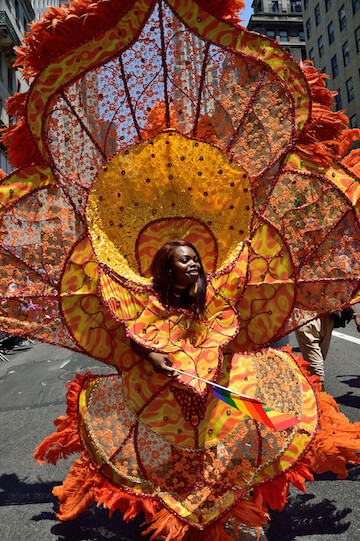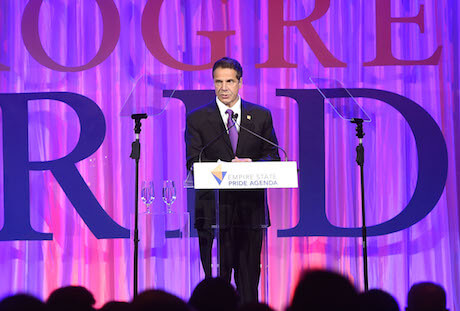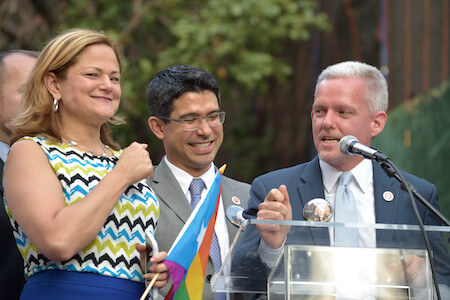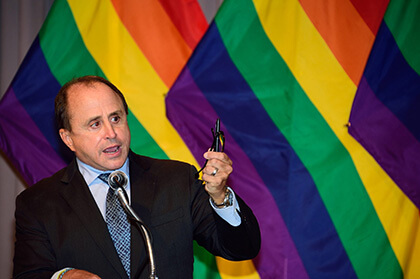For too long, self-serving members of two Lower Manhattan community boards have drained our city’s neighborhoods of their lifeblood and vitality through a sustained war on nightlife. Finally, we are beginning to turn the tide.
A new Office of Nightlife created by City Council legislation and introduced by the well-regarded Brooklyn Councilmember Rafael Espinal, Jr., is now up and running. The woman chosen to head the office is Ariel Palitz. She has the motivation, the smarts, and the drive to bring nightlife back to our city. And most importantly, she is embracing the communities that have historically rallied around nightlife as a means to express their identity and sense of belonging — including our LGBTQ community.
PERSPECTIVE: Insider Trading
Those of you old enough will remember the “good old days” when we had clubs and bars throughout the Village and the Lower East Side. Our community had The Saint on Second Avenue at Sixth Street, where gay men danced till noon, had a lively balcony, and yearly rented lockers for recreational substances. The local community board at that time did not care and thousands of gay men and their friends had unforgettable nights. But this was pre-Susan Stetzer, who serves as district manager of Community Board 3 and virtual dictator over the entire board. An anti-nightlife fanatic, Stetzer has created a situation where the members of Community Board 3 work for her — not the other way around like at other community boards.
Stetzer browbeats liquor license applicants to determine who can open nightlife establishments, where they can be located, and what conditions are necessary for their operation. Bar operators and prospective owners must grovel before the heavy-handed Stetzer for the opportunity to operate a business, and establishments are often not allowed to open within CB3’s district on the Lower East Side. Our community has suffered as the welcome mat has been removed.
And then there is Community Board 2, which covers the Village, Meatpacking, SoHo, and NoHo. In order to prevent new bars from opening, this board — led by another anti-nightlife zealot, Teri Cude — invents onerous “stipulations” engineered to make even opening a proposed venue unprofitable and undesirable.
And that’s just the businesses that want to get in. Existing venues are often harassed by this board, with the chief culprits being Cude, as well as State Liquor Authority Committee co-chairs Bob Ely and Carter Booth, who even venture to examine the venue’s business plans. These busybodies stifle innovation and creativity in a city once considered the capital of both, with Greenwich Village at its center.
Rumor has it that Cude is planning to run for Margaret Chin’s seat on the City Council in 2021. She would use trumped-up anti-bar furor as a base to score points against an LGBTQ community that has largely been forced out of the cradle of our own movement. As a point of fact, if Stonewall had ever applied for a liquor license from Cude’s community board, there is no way it would have been allowed to open!
The two boards alone cost the city millions of dollars and thousands of jobs by closing off entire neighborhoods to restaurants, bars and clubs. They also cost us something even more important. They deny our LGBTQ community the right to gather and socialize; they deny us the right to operate businesses; and by their actions they take away from the city the tax revenue needed to pay for vital services for all of us.
In one egregious example of homophobia in the past several years, a Community Board 2 member advocated against Boots and Saddle from opening on Seventh Avenue South because schoolchildren walking by may look in and see drag queens — in the Village of all places!
In this toxic environment, the first word out of any applicant’s mouth is that they are not opening a disco or club, which these boards will not even consider allowing within their boundaries. These anti-nightlife warriors also work assiduously to harass our legally licensed community establishments. These city-living suburbanites want all the advantages and conveniences of urban living but also want the quiet and quaintness of the suburbs.
With our new nightlife mayor in place, we now have a powerful ally in the fight to preserve and expand nightlife options and rollback the suburbanization of our city. First, we need a district manager at Community Board 3 who serves the board and not herself. We need to remove all political party officials and political club presidents and officers who use the board to advance their careers and garner support of anti-nightlife block associations that think they live in the suburbs. We need new board members who have new perspectives and outlooks on the issues we face — not more “not in my backyard” fanatics who vote against any and all nightlife venues.
On a more positive note, I commend Brooklyn Borough Eric Adams, who is a vocal champion of nightlife and has stood up to those whose opposition is often unwarranted, discriminatory, and irrational.
And on a happy note, I can now report that Judith Clark is closer to being paroled. As many of you may know, I have been assisting Judith in her bid for clemency for the past nine years. Acting Supreme Court Justice John Kelley ordered the New York State Parole Board to hold a new hearing within 60 days and to decide on granting parole within the following 30 days. Judith has spent 37 years at Bedford Hills Correctional Facility for her part in the 1981 Brinks robbery. If Judith is paroled, it will be a major first step in the fight for clemency for many others who face long sentences even though they have been rehabilitated, expressed remorse, and pose no risk to society.
It breaks my heart to see so many women (and men) like Judith who deserve a second chance and their freedom. For more information on this effort, visit Judithclark.org.
Allen Roskoff, the president of the Jim Owles Liberal Democratic Club, co-authored the first gay rights bill ever introduced in the United States. Upcoming: Judicial Politics… the importance of electing and elevating judges and the few bad apples who pervert the system and how the issue of abortion defined some really bad apples.


































